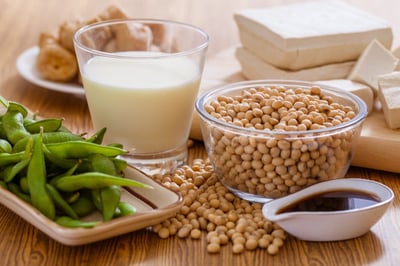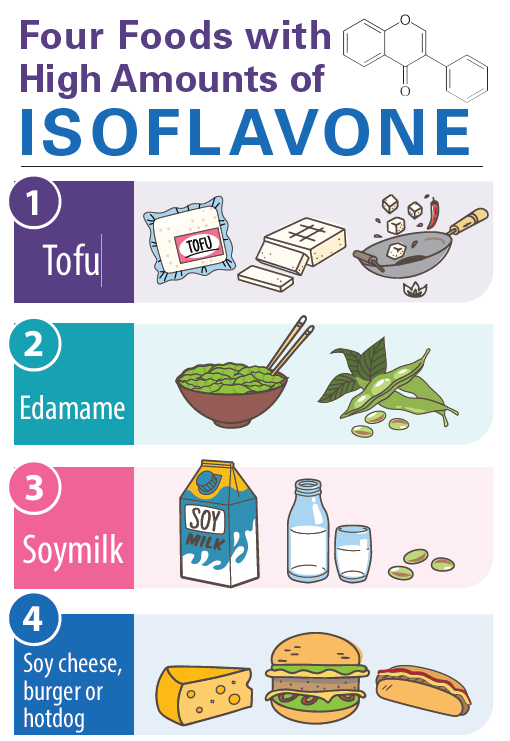Study: Increasing soy in your diet may lower your cancer risk
This study looked at a link between a diet rich in soy and cancer risk. With the addition of more recent literature, this study suggests that soy lowers the risk of cancer in the general population. (Posted 2/24/23)
Este artículo está disponible en español.

RELEVANCE
Most relevant for: People interested in reducing cancer risk.
It may also be relevant for:
- healthy people with average cancer risk


Relevance: Medium


Strength of Science: Medium-High
What is this study about?
This study is a review of recent research that looked at whether the amount of soy and certain substances found in soy, can lower cancer risk and death due to cancer.
Why is this study important?
Soy is an important source of protein for many people. It is often used as a meat substitute, and some cultures use soy products in many of their foods. Some groups, including the American Heart Association, recommend eating 25 milligrams of soy, which is less than 3 ounces of tofu, per day to prevent heart disease and other illnesses.
Past studies looking at the link between eating soy and cancer risk have had different findings. In this study, researchers looked at several recent studies to better understand whether a diet that includes soy can lower cancer risk and death due to cancer.

Study design
Researchers looked at the results of 81 studies. The number of participants in studies varied from just over 1,000 to almost 500,000. A total of 4.15 million participants were included in this analysis. Follow-up varied by study, ranging from 2 years to over 19 years.
Most of the studies used a food frequency questionnaire. This questionnaire listed the foods and beverages that are being studied, such as soy foods, soy milk, miso soup and other foods that contain soy were listed in questionnaires. Participants recorded how often they had each type of food or drink over a specific period of time. Some questionnaires asked about the portion size. One question, for example, asked “How often do you eat three or more ounces of tofu?”
Study findings
The average lifetime risk for cancer is about 40 percent. Researchers found that people who eat a diet that is rich in soy can decrease this slightly to about 36 percent.
Researchers also found that a higher intake of isoflavones, which are compounds found in soy, can further decrease a person’s lifetime risk of any cancer to 34 percent.
When researchers looked at cancer risk reduction by cancer type, the reduction in cancer risk varied. For example, about 6.6 percent of people will develop lung cancer at some point in their lifetime. Soy was shown to reduce the lifetime risk of lung cancer to 4.4 percent. Soy modestly reduced the lifetime risk for other cancers. (see table below).
When researchers looked specifically at soy isoflavones, the lifetime risk reduction was similar to that for soy (see table below).
Soy and soy isoflavones cancer risk reduction varied by cancer type.
| Cancer | Lifetime risk | Lifetime risk for people who eat soy | Lifetime risk for people who eat isoflavones |
| Any | 40% | 36% | 34% |
| Stomach |
1% (men) 0.65% (women) |
0.96% 0.62% |
0.89% 0.58% |
| Breast | 13% | 12.5% | 12.4% |
| 13% | 11.4% | 12.9% | |
| Colorectal | 4% | 3.5% | 3.8% |
| Endometrial | 2.8% | 2.7% | 2.2% |
| Ovarian | 1.3% | 1.2% | 1.2% |
| Lung | 6.6% | 4.4% | 5.6% |
Researchers did not see a link between soy or soy isoflavones and death due to cancer in the general population or in patients diagnosed with cancer.
Context
Past studies of the effect of soy on cancer risk showed mixed or unclear results. The findings of this study support including soy as a part of a healthy diet to reduce the risk of cancer. These results also suggest that soy isoflavones likely contribute the most to cancer risk reduction.
The researchers and other experts think that the benefits of soy, especially soy isoflavones, in preventing cancer is because soy protects the body from damage that is caused by inflammation.
What does this mean for me?
This study suggests that eating soy is safe and may be beneficial. A higher intake of soy and soy isoflavones may reduce your overall risk of cancer as well as your risk for specific cancer types. However, while significant, the risk reduction for all cancer and specific cancer types is small.
The researchers did not suggest an ideal amount of soy for cancer prevention. However, some professional organizations recommend eating 25 milligrams per day. Consult with your doctors and/or dietician before making changes to your cancer prevention plans or to your diet.
Conclusion
This research suggests that soy, particularly soy isoflavones, may reduce cancer risk. While soybeans are the richest source of isoflavones, they are also found in other legumes, including chickpeas, fava beans, pistachios and peanuts, as well as fruits such as currents and raisins. There may be other foods that you can add to your diet that are rich in isoflavones that reduce your overall cancer risk.
Reference
Fan Y, Wang M, Li Z, et al., Intake of Soy, Soy Isoflavones and Soy Protein and Risk of Cancer Incidence and Mortality. Frontiers in Nutrition. 2022. 9:847421.
Disclosure: FORCE receives funding from industry sponsors, including companies that manufacture cancer drugs, tests and devices. All XRAYS articles are written independently of any sponsor and are reviewed by members of our Scientific Advisory Board prior to publication to assure scientific integrity.
Share your thoughts on this XRAY review by taking our brief survey.
posted 2/24/23
The American Cancer Society (ACS) guidelines on exercise, nutrition and weight for cancer prevention recommend the following:
Diet and nutrition
- Follow a healthy eating pattern, including:
- foods that are high in nutrients in amounts that help you acheive and maintain a healthy body weight.
- a variety of vegetables, fiber-rich legumes (beans and peas) and whole fruits in a variety of colors. Consume at least 2½ to 3 cups of vegetables and 1½ to 2 cups of fruit each day, depending on your calorie requirements.
- whole grains rather than refined grains. At least half of the grains you eat should be whole grains.
- A healthy eating pattern that limits or does not include:
- red and processed meats.
- sugar-sweetened beverages.
- highly processed foods and refined grain products.
- It is best not to drink alcohol. People who choose to drink alcohol should:
- have no more than 1 drink per day (women) or 2 drinks per day (men).
Exercise
- Exercise regularly.
- Adults should get at least 150 minutes of moderate-intensity activity (equal to a brisk walk) or 75 minutes of vigorous activity (heart rate is increased, breathing is faster and you are sweating) each week, preferably spread throughout the week.
- Physical activity has been shown to lower the risk of several types of cancer, including breast, endometrial, and colon. It also reduces the risk of other serious diseases including diabetes and heart disease.
Weight
- Achieve and keep a healthy weight.
- Being overweight or obese is a risk factor for many cancers, including breast, colon, endometrial and pancreatic. You can control your weight through regular exercise and healthy eating.
Other experts, including the following, also provide guidelines for exercise, nutrition and health:
- The Academy of Nutrition and Dietetics
- The United States Office of Disease Prevention and Health Promotion
- The American Institute for Cancer Research
Updated: 07/19/2022
The following studies focus on nutrition and cancer prevention:
Colorectal cancer
- NCT05396846: My Best GI Eating Study. This study tests three diets in people who are overweight and who have an increased risk of colorectal cancer.
Visit our Featured Research Page and Research Search and Enroll Tool to find additional studies enrolling people with or at high risk for cancer.
Updated: 05/29/2024